Hope everyone is well.I am having a bit of an issue implementing the kd tree from pbrt v2.It's fast but all the normals on the model are wrong after rendering.The funny thing is if I change the values of pMin and pMax in the Bounding Box constructor,I get the correct model with the correct normals but the render takes substantially longer.I dont know what could be causing this.By the way pbrt v2 uses a left-handed coordinate system while I am using a right-handed coordinate system.I have tried changing my coordinate to left-handed and also importing models from a left-handed system instead of a right-handed system but the issue still remains.At one point it worked but the models positions were reversed.Its best to show you my code so u can better understand my dilemma.
*BOUNDING BOX CODE *
class BBox
{
public:
Point pMin,pMax;
BBox(){
pMin = Point(INFINITY,INFINITY,INFINITY);
pMax = Point(-INFINITY,-INFINITY,-INFINITY);
}
BBox(const Point& p) : pMin(p),pMax(p) { }
BBox(const Point& p1,const Point& p2) {
pMin = Point(min(p1.x,p2.x),min(p1.y,p2.y),min(p1.z,p2.z));
pMax = Point(max(p1.x,p2.x),max(p1.y,p2.y),max(p1.z,p2.z));
}
Point boxCentroid() const {
float x = (pMin.x+pMax.x)/2;
float y = (pMin.y+pMax.y)/2;
float z = (pMin.z+pMax.z)/2;
return Point(x,y,z);
}
BBox Union(const BBox &b,const Point& p) {
BBox ret = b;
ret.pMin.x = min(b.pMin.x,p.x);
ret.pMin.y = min(b.pMin.y,p.y);
ret.pMin.z = min(b.pMin.z,p.z);
ret.pMax.x = max(b.pMax.x,p.x);
ret.pMax.y = max(b.pMax.y,p.y);
ret.pMax.z = max(b.pMax.z,p.z);
return ret;
}
friend BBox Union(const BBox& b,const BBox& b2){
BBox ret;
ret.pMin.x = min(b.pMin.x, b2.pMin.x);
ret.pMin.y = min(b.pMin.y, b2.pMin.y);
ret.pMin.z = min(b.pMin.z, b2.pMin.z);
ret.pMax.x = max(b.pMax.x, b2.pMax.x);
ret.pMax.y = max(b.pMax.y, b2.pMax.y);
ret.pMax.z = max(b.pMax.z, b2.pMax.z);
return ret;
}
bool Overlaps(const BBox &b) const {
bool x = (pMax.x >= b.pMin.x) && (pMin.x <= b.pMax.x);
bool y = (pMax.y >= b.pMin.y) && (pMin.y <= b.pMax.y);
bool z = (pMax.z >= b.pMin.z) && (pMin.z <= b.pMax.z);
return (x && y && z);
}
bool Inside(const Point& pt) const {
return (pt.x >= pMin.x && pt.x <= pMax.x &&
pt.y >= pMin.y && pt.y <= pMax.y &&
pt.z >= pMin.z && pt.z <= pMax.z);
}
void Expand(float delta) {
pMin -= Vector(delta,delta,delta);
pMax += Vector(delta,delta,delta);
}
float SurfaceArea() const {
Vector d = pMax - pMin;
return 2.f * (d.x*d.y + d.x*d.z + d.y*d.z);
}
float Volume() const {
Vector d = pMax - pMin;
return d.x*d.y*d.z;
}
int MaximumExtent() const {
Vector diag = pMax - pMin;
if (diag.x > diag.y && diag.x > diag.z)
return 0;
else if (diag.y > diag.z)
return 1;
else
return 2;
}
const Point &operator[](int i) const {
//Assert(i == 0 || i == 1);
return (&pMin)[i];
}
Point &operator[](int i) {
//Assert(i == 0 || i == 1);
return (&pMin)[i];
}
Point Lerp(float tx, float ty, float tz) const {
return Point(::Lerp(tx, pMin.x, pMax.x), ::Lerp(ty, pMin.y, pMax.y),
::Lerp(tz, pMin.z, pMax.z));
}
Vector Offset(const Point &p) const {
return Vector((p.x - pMin.x) / (pMax.x - pMin.x),
(p.y - pMin.y) / (pMax.y - pMin.y),
(p.z - pMin.z) / (pMax.z - pMin.z));
}
void BBox::BoundingSphere(Point *c, float *rad) const {
*c = pMin * 0.5f + pMax * 0.5f;
*rad = Inside(*c) ? Distance(*c, pMax) : 0.f;
}
bool IntersectP(const Ray &ray,float *hitt0,float *hitt1) const {
float t0 = 0.00001f, t1 = INFINITY;
for (int i = 0; i < 3; ++i) {
// Update interval for _i_th bounding box slab
float invRayDir = 1.f / ray.d[i];
float tNear = (pMin[i] - ray.o[i]) * invRayDir;
float tFar = (pMax[i] - ray.o[i]) * invRayDir;
// Update parametric interval from slab intersection $t$s
if (tNear > tFar) swap(tNear, tFar);
t0 = tNear > t0 ? tNear : t0;
t1 = tFar < t1 ? tFar : t1;
if (t0 > t1) return false;
}
if (hitt0) *hitt0 = t0;
if (hitt1) *hitt1 = t1;
return true;
}
};
If I use the current default BBox constructor with the above pMin and pMax values.I get this
But if I change it to
pMin = Point(-INFINITY,-INFINITY,-INFINITY);
pMax = Point(INFINITY,INFINITY,INFINITY);
I get the right model.This...
But it takes substantially longer.(7secs to 51 minutes) You see the issue ??? Anyways I need help.Any help is appreciated.Thanks Here is the rest of the necessary code (KD-TREE) and (CAMERA)
*KD TREE CODE *
struct BoundEdge
{
//BoundEdge Methods
BoundEdge() { }
BoundEdge(float tt,int pn,bool starting){
t = tt;
primNum = pn;
type = starting ? START : END;
}
bool operator<(const BoundEdge &e) const {
if (t == e.t)
return (int)type < (int)e.type;
else return t < e.t;
}
float t;
int primNum;
enum { START,END } type;
};
struct KdAccelNode
{
void initLeaf(uint32_t *primNums,int np,MemoryArena &arena);
void initInterior(uint32_t axis,uint32_t ac,float s)
{
split = s;
flags = axis;
aboveChild |= (ac<<2);
}
float SplitPos() const { return split; }
uint32_t nPrimitives() const { return nPrims >> 2; }
uint32_t SplitAxis() const { return flags & 3; }
bool isLeaf() const { return (flags & 3)==3; }
uint32_t AboveChild() const { return aboveChild >> 2; }
union{
float split;
uint32_t onePrimitive;
uint32_t *primitives;
};
private:
union{
uint32_t flags;
uint32_t nPrims;
uint32_t aboveChild;
};
};
struct KdToDo{
const KdAccelNode *node;
float tMIN,tMAX;
};
class KdTreeAccel : public Primitive
{
public:
KdTreeAccel(const vector<Primitive*> &p,int icost,int tcost,float ebonus,int maxp,int md)
:primitives(p),isectCost(icost),traversalCost(tcost),emptyBonus(ebonus),maxPrims(maxp),maxDepth(md)
{
//Build Kd-Tree
nextFreeNode = nAllocedNodes = 0;
if(maxDepth <= 0)
maxDepth = Round2Int(8+1.3f * Log2Int(float(primitives.size())));
//<Compute Bounds>
vector<BBox> primBounds;
primBounds.reserve(primitives.size());
for(uint32_t i=0;i<primitives.size();++i)
{
BBox b = primitives[i]->BoxBound();
bounds = Union(bounds,b);
primBounds.push_back(b);
}
//<Allocate Working Memory>
BoundEdge *edges[3];
for(int i=0;i<3;++i)
edges[i] = new BoundEdge[2*primitives.size()];
uint32_t *prims0 = new uint32_t[primitives.size()];
uint32_t *prims1 = new uint32_t[(maxDepth+1) * primitives.size()];
//<Initialize primNums
uint32_t *primNums = new uint32_t[primitives.size()];
for(uint32_t i=0;i<primitives.size();++i)
primNums[i] = i;
//<Start Recursive Construction
buildTree(0,bounds,primBounds,primNums,primitives.size(),maxDepth,edges,prims0,prims1);
//<Free Memory
delete[] primNums;
for (int i = 0; i < 3; ++i)
delete[] edges[i];
delete[] prims0;
delete[] prims1;
}
virtual bool intersect(const Ray& r,float t_min,float t_max,primitive_record &rec) const;
virtual bool intersect_p(const Ray& r,float t_min,float t_max) const;
virtual float area() const;
virtual Vector _normal(const Point& in_point) const;
virtual Point randomSamplePoint() const;
virtual BBox BoxBound() const ;
virtual Point centroid() const ;
private:
void buildTree(int nodeNum,const BBox &nodeBounds,const vector<BBox> &allPrimBounds,uint32_t *primNums,
int nPrimitives,int depth,BoundEdge *edges[3],uint32_t *prims0,uint32_t *prims1,
int badRefines=0);
int isectCost,traversalCost,maxPrims,maxDepth;
float emptyBonus;
vector<Primitive*> primitives;
KdAccelNode *nodes;
int nAllocedNodes,nextFreeNode;
BBox bounds;
MemoryArena arena;
};
void KdAccelNode::initLeaf(uint32_t *primNums,int np,MemoryArena &arena)
{
flags = 3;
nPrims |= (np<<2);
//Store primitive id for leaf node
if(np == 0)
onePrimitive = 0;
else if(np == 1)
onePrimitive = primNums[0];
else{
primitives = arena.Alloc<uint32_t>(np);
for(int i=0;i<np;++i)
primitives[i] = primNums[i];
}
}
void KdTreeAccel::buildTree(int nodeNum,const BBox &nodeBounds,const vector<BBox> &allPrimBounds,uint32_t *primNums,
int nPrimitives,int depth,BoundEdge *edges[3],uint32_t *prims0,uint32_t *prims1,
int badRefines)
{
//Get Next Free Node
assert(nodeNum == nextFreeNode);
if(nextFreeNode == nAllocedNodes){
int nAlloc = max(2*nAllocedNodes,512);
KdAccelNode *n = AllocAligned<KdAccelNode>(nAlloc);
if(nAllocedNodes > 0){
memcpy(n,nodes,nAllocedNodes*sizeof(KdAccelNode));
FreeAligned(nodes);
}
nodes = n;
nAllocedNodes = nAlloc;
}
++nextFreeNode;
//Initialize leaf Node
if(nPrimitives <= maxPrims || depth == 0){
nodes[nodeNum].initLeaf(primNums,nPrimitives,arena);
return;
}
//Initialize Interior Node
//--Choose split axis
int bestAxis = -1, bestOffset = -1;
float bestCost = INFINITY;
float oldCost = isectCost * float(nPrimitives);
float totalSA = nodeBounds.SurfaceArea();
float invTotalSA = 1.f / totalSA;
Vector d = nodeBounds.pMax - nodeBounds.pMin;
uint32_t axis = nodeBounds.MaximumExtent();
int retries = 0;
retrySplit:
for (int i = 0; i < nPrimitives; ++i) {
int pn = primNums[i];
const BBox &bbox = allPrimBounds[pn];
edges[axis][2*i] = BoundEdge(bbox.pMin[axis], pn, true);
edges[axis][2*i+1] = BoundEdge(bbox.pMax[axis], pn, false);
}
sort(&edges[axis][0], &edges[axis][2*nPrimitives]);
int nBelow = 0, nAbove = nPrimitives;
for (int i = 0; i < 2*nPrimitives; ++i) {
if (edges[axis][i].type == BoundEdge::END) --nAbove;
float edget = edges[axis][i].t;
if (edget > nodeBounds.pMin[axis] &&
edget < nodeBounds.pMax[axis]) {
//Compute cost for split at ith edge
uint32_t otherAxis0 = (axis + 1) % 3, otherAxis1 = (axis + 2) % 3;
float belowSA = 2 * (d[otherAxis0] * d[otherAxis1] +
(edget - nodeBounds.pMin[axis]) *
(d[otherAxis0] + d[otherAxis1]));
float aboveSA = 2 * (d[otherAxis0] * d[otherAxis1] +
(nodeBounds.pMax[axis] - edget) *
(d[otherAxis0] + d[otherAxis1]));
float pBelow = belowSA * invTotalSA;
float pAbove = aboveSA * invTotalSA;
float eb = (nAbove == 0 || nBelow == 0) ? emptyBonus : 0.f;
float cost = traversalCost +
isectCost * (1.f - eb) * (pBelow * nBelow + pAbove * nAbove);
if (cost < bestCost) {
bestCost = cost;
bestAxis = axis;
bestOffset = i;
}
}
if (edges[axis][i].type == BoundEdge::START) ++nBelow;
}
assert(nBelow == nPrimitives && nAbove == 0);
//--Create leaf if np good splits found
if (bestAxis == -1 && retries < 2) {
++retries;
axis = (axis+1) % 3;
goto retrySplit;
}
if (bestCost > oldCost) ++badRefines;
if ((bestCost > 4.f * oldCost && nPrimitives < 16) ||
bestAxis == -1 || badRefines == 3) {
nodes[nodeNum].initLeaf(primNums, nPrimitives, arena);
return;
}
//--Classify primitives with respect to split
int n0 = 0, n1 = 0;
for (int i = 0; i < bestOffset; ++i)
if (edges[bestAxis][i].type == BoundEdge::START)
prims0[n0++] = edges[bestAxis][i].primNum;
for (int i = bestOffset+1; i < 2*nPrimitives; ++i)
if (edges[bestAxis][i].type == BoundEdge::END)
prims1[n1++] = edges[bestAxis][i].primNum;
//--Recursively initialize children nodes
float tsplit = edges[bestAxis][bestOffset].t;
BBox bounds0 = nodeBounds, bounds1 = nodeBounds;
bounds0.pMax[bestAxis] = bounds1.pMin[bestAxis] = tsplit;
buildTree(nodeNum+1, bounds0,
allPrimBounds, prims0, n0, depth-1, edges,
prims0, prims1 + nPrimitives, badRefines);
uint32_t aboveChild = nextFreeNode;
nodes[nodeNum].initInterior(bestAxis, aboveChild, tsplit);
buildTree(aboveChild, bounds1, allPrimBounds, prims1, n1,
depth-1, edges, prims0, prims1 + nPrimitives, badRefines);
}
bool KdTreeAccel::intersect(const Ray& r,float t_min,float t_max,primitive_record &rec) const {
//Compute initial Parametric range of ray inside kd-tree extent
float tMIN,tMAX;
if(!bounds.IntersectP(r,&tMIN,&tMAX))
return false;
//Prepare to traverse kd-tree for ray
Vector invDir(1.f/r.d.x,1.f/r.d.y,1.f/r.d.z);
#define MAX_TODO 64
KdToDo todo[MAX_TODO];
int todoPos = 0;
//Traverse kd-tree nodes in order for ray
bool hit = false;
const KdAccelNode *node = &nodes[0];
while (node != NULL) {
if(t_max < tMIN) break;
if(!node->isLeaf())
{
//Process kd-tree interior node
int axis = node->SplitAxis();
float tplane = (node->SplitPos() - r.o[axis]) * invDir[axis];
const KdAccelNode *firstChild, *secondChild;
int belowFirst = (r.o[axis] < node->SplitPos()) ||
(r.o[axis] == node->SplitPos() && r.d[axis] <= 0);
if (belowFirst) {
firstChild = node + 1;
secondChild = &nodes[node->AboveChild()];
}
else {
firstChild = &nodes[node->AboveChild()];
secondChild = node + 1;
}
if (tplane > tMAX || tplane <= 0)
node = firstChild;
else if (tplane < tMIN)
node = secondChild;
else {
todo[todoPos].node = secondChild;
todo[todoPos].tMIN = tplane;
todo[todoPos].tMAX = tMAX;
++todoPos;
node = firstChild;
tMAX = tplane;
}
}
else
{
//Check for intersections inside leaf node
uint32_t nPrimitives = node->nPrimitives();
if (nPrimitives == 1) {
primitive_record tempRec;
Primitive* prim = primitives[node->onePrimitive];
//Check one prim inside leaf node
if(prim->intersect(r,t_min,t_max,tempRec))
{
rec = tempRec;
hit = true;
}
}
else {
primitive_record tempRec;
float closest_so_far = t_max;
uint32_t *prims = node->primitives;
for (uint32_t i = 0; i < nPrimitives; ++i)
{
//Check one prim inside leaf node
if(primitives[prims[i]]->intersect(r,t_min,closest_so_far,tempRec))
{
hit = true;
closest_so_far = tempRec.t;
rec = tempRec;
}
}
}
//Grab next node to process from todo list
if (todoPos > 0) {
--todoPos;
node = todo[todoPos].node;
tMIN = todo[todoPos].tMIN;
tMAX = todo[todoPos].tMAX;
}
else
break;
}
}
return hit;
}
*CAMERA CODE *
Vector random_in_unit_disk() {
Vector p;
do{
p = 2.f*Vector(drand48(),drand48(),0)-Vector(1.f,1.f,0.f);
}while(Dot(p,p) >= 1.f);
return p;
}
class Camera {
public:
Vector lower_left_corner;
Vector horizontal;
Vector vertical;
Point origin;
Vector u,v,w;
float lens_radius; //Focus
float time0,time1;
Camera(Point lookfrom,Point lookat,Vector vup,
float vfov,float aspect,float aperture,float focus_dist,float t0,float t1){
time0 = t0;
time1 = t1;
lens_radius = aperture/2;
float theta = vfov*M_PI/180.f;
float half_height = tanf(theta/2.f);
float half_width = aspect*half_height;
origin = lookfrom;
w = Normalize(lookfrom - lookat);
u = Normalize(Cross(vup,w));
v = Cross(w,u);
lower_left_corner = toVector(origin) - half_width*focus_dist*u - half_height*focus_dist*v - focus_dist*w;
horizontal = 2*half_width*focus_dist*u;
vertical = 2*half_height*focus_dist*v;
}
Ray get_ray(float s,float t) {
Vector rd = lens_radius*random_in_unit_disk();
Vector offset = u * rd.x + v * rd.y;
float time = time0 + drand48()*(time1-time0);
return Ray(origin + offset,lower_left_corner + s*horizontal + t*vertical - toVector(origin) - offset,time);
}
};

